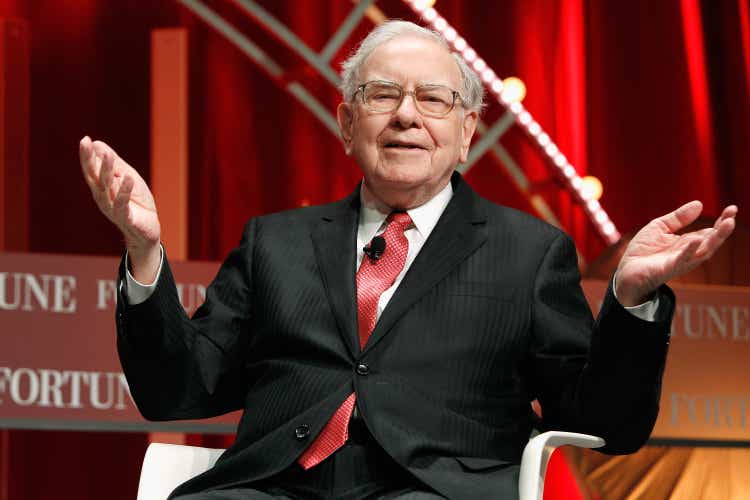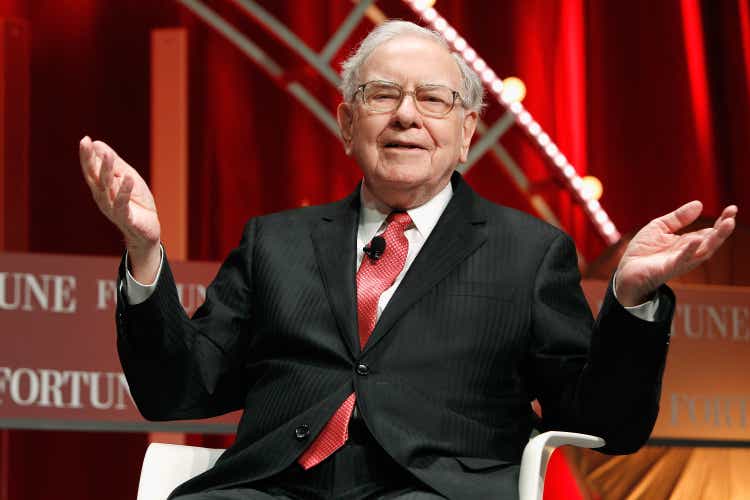
Paul Morigi
Berkshire Hathaway (NYSE:BRK.B) (NYSE:BRK.A) Q4 operating earnings rose 28% from a year ago, driven by improvements in insurance underwriting and investment income, which more than offset declines at its railroad, utilities and energy, and other businesses, the company disclosed on Saturday.
The company doubled the amount of its common stock it repurchased to $2.2B during the quarter compared with $1.1B in Q3, bringing 2023 purchases to $9.2B.
The investment titan held ~$167.6B in cash and short-term securities on its balance sheet as of Dec. 31, 2023, climbing from $157B at Sept. 30.
Q4 operating income of $8.48B declined from $10.8B in Q3 and increased from $6.63B a year ago. Insurance underwriting income more than quintupled, while its insurance investment income increased by 38%.
Insurance float stood at ~$169B at Dec. 31, 2023, up from $167B at Sept. 30 and $164B at Dec. 31, 2022.
Operating income by segment vs. a year ago:
- Insurance – underwriting: $848M vs. $160M
- Insurance – investment income: $2.76B vs. $2.00B
- Railroad: $1.36B vs. $1.47B
- Utilities and energy: $632M vs. $739M
- Other businesses: $3.69B vs. $3.71B
- Other: -$804M vs. -$1.45B
Investment and derivative gains, most of which are unrealized, surged to $29.1B in Q4, compared with losses of $23.5B in Q3 and gains of $11.5B in Q4 2022.
Looking at Berkshire’s (BRK.B) investmens in equities, ~79% of the portfolio’s fair value was concentrated in five companies — Apple (AAPL) – $174.3B; Bank of America (BAC) – $34.8B; American Express (AXP) – $28.4B, Coca-Cola (KO) – $23.6B, and Chevron (CVX) – $18.8B. That compares with 78% concentration in the same five companies as of Sept. 30, 2023.
Its stake in Occidental Petroleum (OXY) rose to $14.5B, at fair value from $12.2B at Dec. 31, 2022. Meanwhile, its holdings in Kraft Heinz (KHC) declined to $12.0B, at fair value, from $13.2B.
In Warren Buffett’s annual letter to shareholders, also released on Saturdy, he points to disappointments in the company’s full-year 2023 earnings — its railroad, BNSF, and Berkshire Hathaway Energy (“BHE”).
“Last year BNSF’s earnings declined more than I expected, as revenues fell,” Buffett wrote. “Though fuel costs also fell, wage increases, promulgated in Washington, were far beyond the country’s inflation goals. This differential may recur in future negotiations.” Still, he sticks by Berkshire’s commitment to the business. “A century from now, BNSF will continue to be a major asset of the country and of Berkshire. You can count on that.”
At BHE, most of its large electric-utility businesses, as well as its gas pipelines, “performed about as expected,” he said. However, “the regulatory climate in a few states has raised the specter of zero profitability or even bankruptcy.”
“Now, the fixed-but-satisfactory-return pact has been broken in a few states, and investors are becoming apprehensive that such ruptures may spread. Climate change adds to their worries,” Buffett wrote.
He estimates it will be “many years” until BHE knows its final forest-fire losses and “can intelligently make decisions about the desirability of future investments in vulnerable western states.”
He questions whether utilities will continue to operate in the private sector. “Whatever the case at Berkshire, the final result for the utility industry may be ominous: Certain utilities might no longer attract the savings of American citizens and will be forced to adopt the public-power model.”


